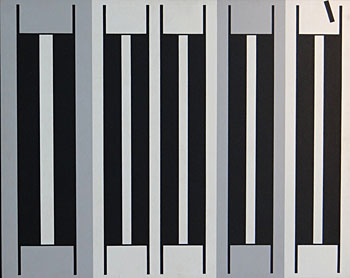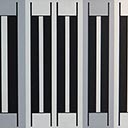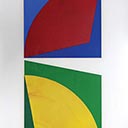Untitled
49 x 61 cm
est. $20,000 - 30,000
Provenance:
Fletcher Trust Collection
Untitled is a remarkable work for the way it forms a stylistic bridge between Walters' earliest abstract works and the final fifteen years of his oeuvre while he took a break from his koru paintings. The work also gives us a clue as to the artist's interest, not only in European abstraction, but the lessons of Dadaism, and especially of Jean Arp who compared the role of the artist to a plant bearing fruit.
Walters largely moved between New Zealand and Australia throughout his career, working in Wellington, Auckland, Sydney, Melbourne and finally Christchurch. His early career was punctuated by a brief but very influential period living in London, Amsterdam and Paris where he gained first-hand experience of Paul Klee, Victor Vasarley, Auguste Herbin, Giorgio Morandi, Kazimir Malevich, Theo van Doesburg, Joan Miró, Jean Arp and Piet Mondrian.
Although by the 1970s he was working in acrylic on canvas, paintings from this period such as Untitled started out as paper collages. Walters would cut out a variety of shapes of coloured paper and arrange and re-arrange them on a larger sheet until he had arrived at the composition of forms that best suited him, and from there he would commence painting.
This is a slow and deliberative process, but it is also open to spontaneous chance discoveries, and these two aspects give the artist great freedom to work through numerous possibilities before settling on the most satisfying. Here, the lessons of Dadaism and especially of Jean Arp seem important, because it was Arp who also developed both paintings and relief sculptures from experiments with paper collage. "According to the laws of chance" Arp would drop cut paper shapes (and later torn pieces of paper) - like fruit from a plant - onto a plane ground and then arrange his design based on the compositional juxtapositions suggested by where the paper pieces landed.
He was careful to explain however that his compositions were not the result of "the law of senselessness": they were not, as people have claimed, random.
Take a look at the small black shape at the top right hand corner of Walters' painting. Is this the result of the operation of the "laws of chance" in the moments when Walters is moving pieces of cut paper around to develop the plan for his painting? It could be, but whether it is or not, it reveals the artist's delight in creating surprising shifts and formal juxtapositions that have a lasting resonance.
ROB GARRETT





